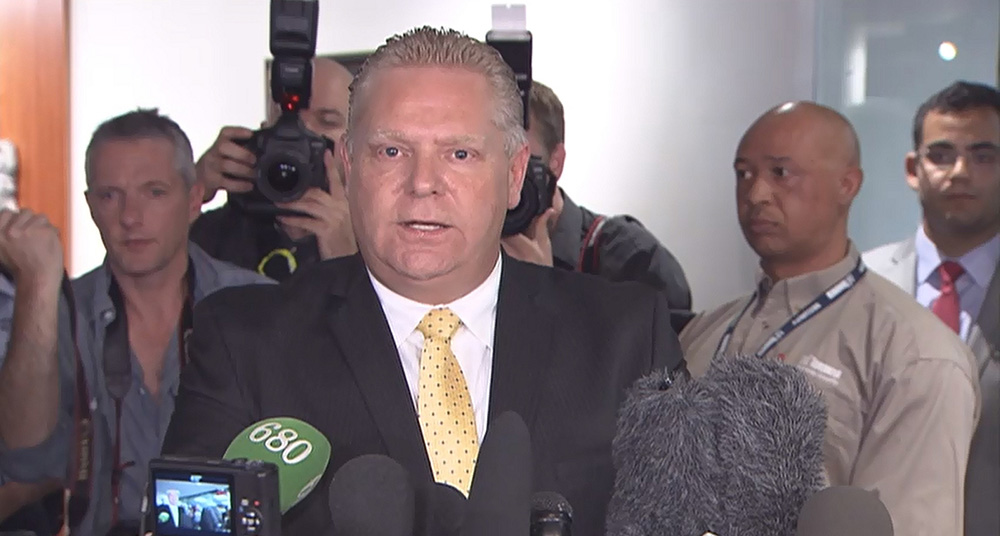Hey Ontario, that’s quite the election you have shaping up in June. Keep an eye to the west because B.C. can offer some words of support and encouragement as a province that went through something similar last year. Here are seven reasons why the contest in B.C. prefigures Ontario’s looming political smackdown.
1. Flagging polls for Liberal (branded) premiers.
In the run-up to B.C.’s provincial election last May, then BC Liberal premier Christy Clark’s approval ratings dipped into the 20s. Ontario’s Liberal Premier Kathleen Wynne has faced even choppier waters, sinking into the teens in some polls.
2. Maybe a teetering minority government undone by allied opposition.
The Progressive Conservatives’ approval rating jumped this month after they ended up with no leader. Patrick Brown resigned due to sexual harassment allegations that he denies. (Though Brown now says he wants to run to replace himself.) After he quit, the number of voters saying they will vote Progressive Conservative jumped from 35 per cent to 43 per cent. This put the party in a “position to form majority government,” according to Campaign Research.
But 43 per cent is still five points shy of the 48 per cent shared by the NDP (20 per cent) and Liberals (28 per cent).
Could Ontario find itself with a result similar to B.C.’s last election — a coalition or alliance of centre-left parties voting no confidence in the winning right-wing party at the first opportunity?
Probably not, but as the provincial election showed in B.C., anything might happen! And parties in Ontario have certainly taken note.
3. Familiar faces behind the scenes.
Did you say that most members of Clark’s party don’t really fit ideologically with Ontario or federal Liberals? Good point. In Ontario, a lot of them would call themselves (perhaps just as confusingly) Progressive Conservatives. Case in point: even pollster Campaign Research, cited above and frequently in major newspapers, has shared personnel with both BC Liberal and Ontario PC campaigns. It is led by Richard Ciano, former president of the Ontario Progressive Conservative party, and Nick Kouvalis, a key strategist on campaigns for both Rob Ford and Christy Clark. One needn’t look long to find names similarly repeated in Brown’s hastily disbanded campaign team and both Christy Clark and Stephen Harper’s election crews.
4. Another test for first-past-the-post elections.
The incumbent Ontario Liberals won in 2014 with just 38 per cent of the popular vote. This after then PC leader Tim Hudak made a disastrous last-minute promise to fire 100,000 civil servants. Are Ontarians bothered that not even four in 10 voters delivered a decisive majority to one party? Are they now clamouring, as many are in B.C., for electoral reform to more accurately reflect the will of each voter? So far the issue has not even been on the radar. Perhaps because the last time Ontarians voted on the issue, in 2007, 63 per cent said keep the status quo.
However, the Ontario government’s pre-referendum public education process was flawed and heavily criticized. As many as 80 per cent of Ontarians surveyed knew nothing about the form of proportional representation to be voted on nor the Citizens’ Assembly (modelled after B.C.’s process in advance of the 2005 referendum) charged with putting forward a recommended option. The minimal public education campaign efforts by the government began barely two months in advance of the referendum.
Additionally, editorial boards at the Toronto Star, Globe and Mail and National Post aligned against reform. Beyond editorials, researchers at the University of Toronto analyzing coverage on the assembly process, the electoral reform recommendation and the referendum found that 45 per cent of news articles were negative, 37 per cent neutral and only 19 per cent could be considered positive.
In B.C., electoral reform made it into 2017 campaign promises even though the previous election produced a majority with 44 per cent of the vote, higher than in Ontario. However, previous referendums offered reformers more hope. In 2005, 57 per cent of voters favoured change — just below the 60-per-cent threshold set by the Liberal government. In 2009, 61 per cent supported sticking with the status quo.
Perhaps electoral reform will yet find its way into the discussion in Ontario.
5. Hydro megaprojects and rates are hot issues.
In B.C. many who voted for the NDP led by John Horgan believed their choice would scuttle the $10.7-billion Site C dam project. They were wrong, as Horgan gave the megaproject the green light. At least B.C. will have additional renewable hydro generation capacity in its still publicly owned utility. Not so in Ontario.
Ontarians are mega-spending on energy without a megaproject to show for it, and that’s going to be a huge election issue. Wynne approved a 30-year loan to lower hydro rates in the short term and provide breaks for low-income ratepayers. Paying the interest will eventually cost Ontarians $25 billion.
Wynne made the move facing deep unpopularity over her government’s decision to sell Hydro One to private interests at a time when Ontarians are paying the highest rates in the country.
Both policies were at least as controversial as Site C. Still, the only party leader protesting those decisions is the NDP’s Andrea Horwath, who proposes to lower Hydro rates further while buying back 30 per cent of the shares that Wynne sold.
6. Minimum wage hike a hot issue.
In B.C., the NDP’s Horgan ran on a pledge to raise the minimum wage above $15. But he isn’t hurrying to get there, aiming to up it in several increments between now and 2021. Wynne’s Liberal government aims to hit roughly the same $15 target in 2019, and faced criticism for an increase from $11.60 an hour to $14 last January.
B.C.’s minimum wage now stands at $11.35, which is lower than Ontario’s by $2.65 an hour. All the Ontario Conservative leadership candidates except Caroline Mulroney — including, unsurprisingly, right-wing Toronto councillor Doug Ford — hinted at slowing the pace of coming minimum wage increases in the first debate. So, on election day, will Wynne pay a price for her more aggressive increase? So far the opposite seems true, her Ontario Liberals picking up two per cent in voter intent polls based on the issue.
7. Pipelines! (Um, not so much.)
All the Ontario party leaders might have been watching B.C.’s pipeline war with Alberta. Except, poof, the issue disappeared from the Ontario political landscape last October when TransCanada cancelled its Energy East and Eastern Mainline projects. Sit back, Ontarians, have a nice glass of B.C. wine, and relax! Indeed, anti-pipeline activists in Ontario and Quebec, who are still organizing and celebrating the project cancellations, are vowing to drink up the $70 million in B.C. wine sales lost when Alberta’s NDP Premier Rachel Notley banned the product after Horgan put the brakes on the Kinder Morgan TransMountain pipeline to the west coast.
B.C. can’t offer any guidance on the Progressive Conservative leadership spectacle that continues to unfold in Ontario. You’re on your own there. Nonetheless, the two provinces have plenty of reasons to keep an eye on one another in the coming months. ![]()
Read more: Politics
















Tyee Commenting Guidelines
Comments that violate guidelines risk being deleted, and violations may result in a temporary or permanent user ban. Maintain the spirit of good conversation to stay in the discussion.
*Please note The Tyee is not a forum for spreading misinformation about COVID-19, denying its existence or minimizing its risk to public health.
Do:
Do not: